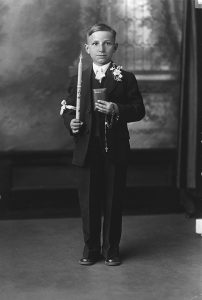Memory is powerful; I am reminded of this often. On Monday March 12, 2018 I attended the funeral of my dear friend Frank Palmeri; he died at the age of 92. I attended the service out of respect, gratitude, and love for Frank—ultimately, the service returned to the same to me. I can still see Frank peacefully in his casket; generally a morbid sight to me, I did not feel an aversion, instead I felt gratitude. Gratitude for Frank’s friendship, the genuine love shared between us, and for my memories of him. To my surprise and honor, I found at Frank’s funeral his family panel from the exhibit The Italians of Denver https://www.denverpost.com/2007/04/24/paying-tribute-to-early-italians/. This was a show that I curated in 2007 at the Colorado History Museum/History Colorado. As part of Frank’s eulogy, the project was also mentioned; for a life full of accomplishments, memories and experiences, to have the project and my name mentioned as a part of Frank’s life, moved me beyond words.

Frank’s First Communion photo, taken in May of 1932, hung in the History Colorado exhibit lightbox (some 8 feet high by 4 feet wide) on 13th and Broadway for the run of the Italians of Denver exhibit. Read Frank’s obituary here.
I have come to believe that the memories of people when spoken, written or documented in film, video or other tangible outlets, keeps individuals alive. For me, the extinction of individuals—or final death— occurs when no trace of an individual’s life remains. It is this belief that moves and inspires me; it is the foundation for which I embarked on my journey to document the Italian American experience in Colorado. This is how I met and befriended Frank Palmeri (and countless others). It is the reason I love objects as storytellers. It is why at a young age, one of my best friends was my Uncle Roy; a man’s man, who led a colorful life including running a bar in Delores, Colorado called “Del Rio” with my mom’s sister Delphine. He was also a “junker” or antique dealer in a time before it was fashionable. In my twenties, this belief was also the reason that I recorded the sound of my grandmother’s voice and photo-documented her cooking while writing down recipes she keep only in her mind. It is why being with my mom at the time of my grandmother’s death was so important to me; to literally be with her and watch as she took her last breath. It is why I continue to research, write, and seek stories about the extraordinary lives of ordinary people. It is always with me, as a reminder to be grateful for the sacrifices of those who came before me, sacrifices that have ultimately afforded me the choices and opportunities in my life.
In addition to his love of history and Denver’s Little Italy, Frank Palmeri also shared with me his connections, some of which in time, have developed into once-in-a-lifetime experiences. Making Supersod with the Capillupo family is one such example. In February of this year, I had the privilege of seeing and experiencing a family come together, to make Supersod (a dry-cured Italian salami). More commonly known as Sopresetta, recipes vary from family to family, depending on the region of Italy an individual came from and the availability of ingredients in the immigrant’s new homeland. A transplanted tradition from Italy in the late 1800s, this dried sausage, made the Capillupo Family way, is becoming a dying art. Like so many other craft recipes, Supersod takes skill, time and money; making the continuation of the tradition in Colorado limited.
The gateway to my participation in Supersod Saturday was Capillupo descendant Andy Rogers. Frank Palmeri originally interviewed Andy in 2004. Last year while working with the oral histories from the Italians of Colorado documentation project, I reviewed Andy’s file and found that I had questions for him about his family. As is often the case, I contacted Andy and our discussion led to the making of Supersod. I mentioned to Andy that I still make wine, garden and can tomatoes, and that I would be interested in learning how to make Supersod. The rest, as they say, is history.
For more on Supersod Sunday with the Capillupo Family click here
The reason I include Andy and Supersod Saturday in my writings about the memory of others, is because Andy shares in my belief of honoring those before us through the action of cooking. On a quiet and snowy February 22, 2018, I returned to Andy’s home to put the Supersod in the press that belonged to his uncle Ernie Capillupo (dates). While warming our hands inside for a bit, we started talking about why Andy continues the tradition. Like me, the action of following family recipes, recalls and honors the memory of relatives no longer with us. In making and sharing food, we also share the memory of those whose recipes we hold dear. Recipes shared in trust and love, passed down through the generations, and transformed from uniquely Italian to genuinely Italian American.
Making Supersod:
Only a few days ago, I was again reminded of the shared belief that people die more than once. That the human body disappears but the life of people lives on in those they touched, taught, loved, and affected. That mentioning someone’s name for the last time, is a death of sorts. This sentiment was shared during a performance by Stelth Ulvang who shared the story of a friend, and a song written about that friend that keeps his memory alive. Another musician present that evening was Esme Patterson, who also wrote a song about the same person. In that moment I was struck by the depth and beauty of this shared belief.
Elysium
Song For Jack
In Memory Of, is really a reminder of sorts for me, of the power of genuine interest in others, of a gift that passes between people when they open themselves up, giving and receiving without fear. It is also about the connection between people, and common threads that have the potential to shape and change lives. It is about grand and small adventures and intentionally seeking beauty. It is about gratitude, honor and love.




